This article needs additional citations for verification .(February 2019) |
Nicholas Snowdon Willey also spelt Nicholas Snowden Willey [1] (1946-2011) was an English poet.
Contents

This article needs additional citations for verification .(February 2019) |
Nicholas Snowdon Willey also spelt Nicholas Snowden Willey [1] (1946-2011) was an English poet.

Nicholas Snowdon Willey was born in London on 21 February 1946, to Fred Willey [2] and Eleanor née Snowdon. Fred Willey was Labour Party MP for Sunderland North in the 1945 Labour Government. Both parents came from County Durham. He was educated at University College School, Hampstead, and later at King Alfred School. He started writing poetry at an early age, an activity which continued until his death.
In 1962 at the age of sixteen he had the first of a series of serious depressions, and spent most of that year in hospital. The illness was never to be far away throughout his life.
Willey's work was included in the seminal anthology of beat poets by Michael Horovitz, Children of Albion: Poetry of the Underground in Britain . His work however does not (as he himself considered) lend itself usefully to definition beyond that of poetry itself. He had a profound understanding of the sonorous meaning of poetry, and was a fine reader of his work. A small number of recordings of him are held in the British Library.
The earliest publication of his poetry was The Green Tunnel (Signals Press 1965), [2] [1] a hard-back collection of twenty poems including one especially written to celebrate a London exhibition by Takis entitled "L'espace Interieur". A pamphlet of seven poems, Seven Poems (Villiers Press 1974) also appeared, and both publications are now unobtainable. His poems also appeared regularly in a number of magazines, including Encounter magazine and more recently Ambit . A collection of forty of his early poems, "Liminal Green", (Light Touch Publications 2019) with a CD of readings by Joss Wynne Evans is recently published.
In June 1969 the BBC Third Programme transmitted a reading of Willey's poetry entitled "The Living Poet - Nicholas Willey" introduced by Hallam Tennyson.
In 1973, he met his future wife Sarah at a time when he had been working happily for quite a long period at the Play Library at the BBC. Upon marriage they moved to the West Country eventually settling in a cottage in Wiltshire. There were two children of the marriage, a son, Matt, born in Bristol 1974 and a daughter, Jane born in Bath, Somerset 1977. Also during that period he took a degree in Philosophy at Bristol University.
In later years Willey worked with deaf and blind adults, and also for several years with young adults with learning difficulties.
He died of cancer on 20 November 2011.
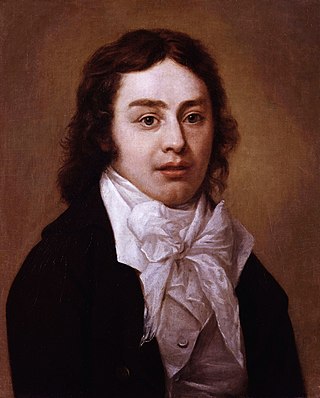
Samuel Taylor Coleridge was an English poet, literary critic, philosopher, and theologian who was a founder of the Romantic Movement in England and a member of the Lake Poets with his friend William Wordsworth. He also shared volumes and collaborated with Charles Lamb, Robert Southey, and Charles Lloyd.

Siegfried Loraine Sassoon was an English war poet, writer, and soldier. Decorated for bravery on the Western Front, he became one of the leading poets of the First World War. His poetry both described the horrors of the trenches and satirized the patriotic pretensions of those who, in Sassoon's view, were responsible for a jingoism-fuelled war. Sassoon became a focal point for dissent within the armed forces when he made a lone protest against the continuation of the war with his "Soldier's Declaration" of July 1917, which resulted in his being sent to the Craiglockhart War Hospital. During this period, Sassoon met and formed a friendship with Wilfred Owen, who was greatly influenced by him. Sassoon later won acclaim for his prose work, notably his three-volume, fictionalised autobiography, collectively known as the Sherston trilogy.
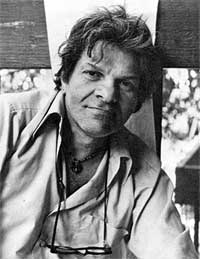
Gregory Nunzio Corso was an American poet and a key member of the Beat movement. He was one of the youngest of the inner circle of Beat Generation writers.
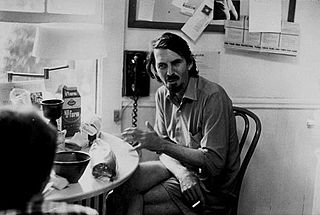
Robert White Creeley was an American poet and author of more than sixty books. He is usually associated with the Black Mountain poets, though his verse aesthetic diverged from that school. He was close with Charles Olson, Robert Duncan, Allen Ginsberg, John Wieners and Ed Dorn. He served as the Samuel P. Capen Professor of Poetry and the Humanities at State University of New York at Buffalo. In 1991, he joined colleagues Susan Howe, Charles Bernstein, Raymond Federman, Robert Bertholf, and Dennis Tedlock in founding the Poetics Program at Buffalo. Creeley lived in Waldoboro, Buffalo, and Providence, where he taught at Brown University. He was a recipient of the Lannan Foundation Lifetime Achievement Award.

Irving Peter Layton, OC was a Romanian-born Canadian poet. He was known for his "tell it like it is" style which won him a wide following but also made him enemies. As T. Jacobs notes in his biography (2001), Layton fought Puritanism throughout his life:
Layton's work had provided the bolt of lightning that was needed to split open the thin skin of conservatism and complacency in the poetry scene of the preceding century, allowing modern poetry to expose previously unseen richness and depth.
Apollonius of Rhodes was an ancient Greek author, best known for the Argonautica, an epic poem about Jason and the Argonauts and their quest for the Golden Fleece. The poem is one of the few extant examples of the epic genre and it was both innovative and influential, providing Ptolemaic Egypt with a "cultural mnemonic" or national "archive of images", and offering the Latin poets Virgil and Gaius Valerius Flaccus a model for their own epics. His other poems, which survive only in small fragments, concerned the beginnings or foundations of cities, such as Alexandria and Cnidus places of interest to the Ptolemies, whom he served as a scholar and librarian at the Library of Alexandria. A literary dispute with Callimachus, another Alexandrian librarian/poet, is a topic much discussed by modern scholars since it is thought to give some insight into their poetry, although there is very little evidence that there ever was such a dispute between the two men. In fact almost nothing at all is known about Apollonius and even his connection with Rhodes is a matter for speculation. Once considered a mere imitator of Homer, and therefore a failure as a poet, his reputation has been enhanced by recent studies, with an emphasis on the special characteristics of Hellenistic poets as scholarly heirs of a long literary tradition writing at a unique time in history.
Gael Turnbull was a Scottish poet who was an important figure in the British Poetry Revival of the 1960s and 1970s.

Sir Geoffrey William Hill, FRSL was an English poet, professor emeritus of English literature and religion, and former co-director of the Editorial Institute, at Boston University. Hill has been considered to be among the most distinguished poets of his generation and was called the "greatest living poet in the English language." From 2010 to 2015 he held the position of Professor of Poetry in the University of Oxford. Following his receiving the Truman Capote Award for Literary Criticism in 2009 for his Collected Critical Writings, and the publication of Broken Hierarchies , Hill is recognised as one of the principal contributors to poetry and criticism in the 20th and 21st centuries.
Children of Albion: Poetry of the Underground in Britain, an anthology of poetry, was edited by Michael Horovitz and published by Penguin Books in 1969. According to Martin Booth it was "virtually a manifesto of New Departures doctrine and dogma".

Waldo Goronwy Williams was one of the leading Welsh-language poets of the 20th century. He was also a notable Christian pacifist, anti-war campaigner, and Welsh nationalist. He is often referred to by his first name only.
John Sleigh Pudney was a British poet, journalist and author. He was known especially for his popular poetry written during the Second World War, but he also wrote novels, short stories and children's fiction. His broad-ranging non-fiction, often commissioned, served as his primary source of income.
Jean Adam was a Scottish poet from the labouring classes; her best-known work is "There's Nae Luck Aboot The Hoose". In 1734 she published a volume of her poetry entitled Miscellany poems, but the cost of shipping a substantial number to the British colony of Boston in North America, where they did not sell well, forced her to turn first to teaching and then to domestic labour. She died penniless in Glasgow's Town's Hospital poorhouse at the age of sixty.
Bernard O'Donoghue FRSL is a contemporary Irish poet and academic.
Gwyn Thomas, FLSW was a Welsh poet and academic. He was the second National Poet of Wales, holding the role between 2006 and 2008.
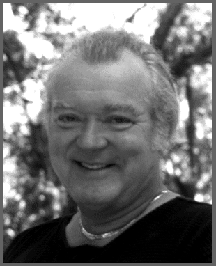
Edmund Skellings was an American poet. He was the Poet Laureate of Florida from 1980 to 2012, and was succeeded by Peter Meinke.
Evan Evans was a Welsh-language poet, clergyman, antiquary and literary critic.
Fred Johnston (1951-2024) was an Irish poet, novelist, literary critic and musician. He was the founder and current director of the Western Writers' Centre in Galway. He co-founded the Irish Writers' Co-operative in 1974, and founded Galway's annual Cúirt International Festival of Literature in 1986.

Yvonne Green was an English poet, translator, writer and barrister.

Romanticism was an artistic, literary, and intellectual movement that originated in Europe toward the end of the 18th century. Scholars regard the publishing of William Wordsworth's and Samuel Coleridge's Lyrical Ballads in 1798 as probably the beginning of the movement in England, and the crowning of Queen Victoria in 1837 as its end. Romanticism arrived in other parts of the English-speaking world later; in the United States, about 1820.
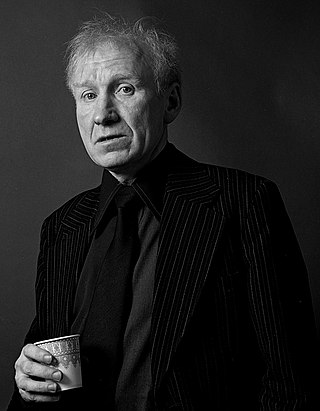
Edward Sean Linden was a Scottish-Irish poet, literary magazine editor, and political activist. From 1969 to 2002, he published and edited the poetry magazine Aquarius, which The Irish Post said made him "one of the leading figures on the international poetry scene". The journal was significant in the growth of British, Irish, and international poets and has been described as Linden's "crowning gift to literature—the nurturing and developing of poetic talent".